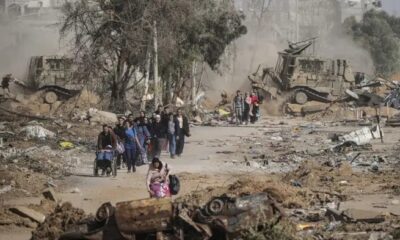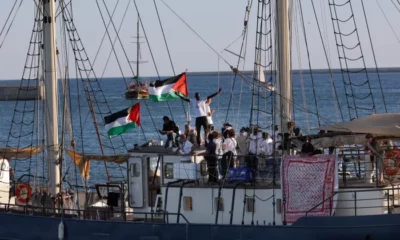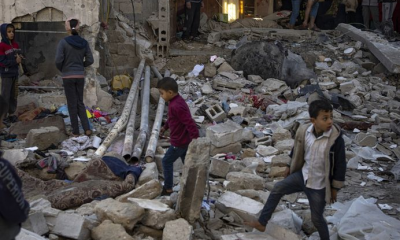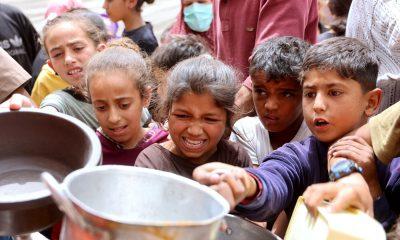News
Israel Accused of Blocking Life-Saving Aid as UN Warns of Deepening Gaza Crisis

As winter draws closer, millions of people in the Gaza Strip find themselves facing a severe humanitarian squeeze. According to United Nations Relief and Works Agency Deputy Commissioner-General Natalie Boucly, there are enough tents, food, and emergency supplies ready to fill up to six thousand truckloads in Jordan and Egypt. Yet only about half of the daily aid that Gaza requires is being allowed in. It has raised an urgent question about whether Israel is fulfilling its duties under international law.
The Reality at the Crossings
Boucly told officials in Brussels that UNRWA has enough stock to support Gaza’s population for roughly three months. The problem is that only around two hundred and fifty to three hundred trucks are entering the territory each day, far short of the five hundred to six hundred trucks needed. She said Israel’s restrictions on aid delivery are preventing UNRWA from providing the basic supplies that a population facing famine desperately needs.
In her remarks, she pointed to the International Court of Justice advisory opinion delivered on 22 October. The Court said Israel must ensure Palestinians have essential supplies and must cooperate with UNRWA to make sure humanitarian assistance reaches civilians. The ICJ found no evidence for Israel’s claim that UNRWA is infiltrated by Hamas and noted that while nine staff members were dismissed over possible involvement in the seven October attacks, broader allegations remained unsubstantiated.
Legal Pressure and Humanitarian Concerns
Boucly said she had no indication that Israel intends to restore contact with UNRWA. She added that the agency is facing a funding shortfall of two hundred million dollars until March. With winter approaching and widespread hunger already documented, she argued that the agency cannot afford to weaken now. In her words, UNRWA is irreplaceable. Its work, she said, continues only because the world has not yet found a political solution to end the conflict.
Human Rights Watch has echoed these concerns. It says Israel continues to defy binding orders by the International Court of Justice by restricting or blocking humanitarian aid from reaching Palestinians in Gaza. The organisation added that Israeli forces have repeatedly failed to meet their obligations to protect civilians. It said hundreds of Palestinians seeking food aid at or near Gaza Humanitarian Foundation sites were shot in acts that amount to war crimes.
International Law and the ICJ Orders
The legal framework behind these accusations is extensive. The international laws Israel is alleged to be flouting fall into three broad areas. The first relates to binding provisional measures issued by the ICJ in the case brought under the Genocide Convention. The Court ordered Israel to prevent acts of genocide, enable the provision of urgent services and humanitarian assistance, and ensure its military does not obstruct the delivery of relief.
The Court later reinforced these orders in March 2024, citing the exceptionally grave deterioration in conditions inside Gaza. The modified measures require Israel to take all necessary steps to ensure, without delay, the unhindered provision of basic services and humanitarian aid. They also call for increased capacity at land crossings and the full cooperation of Israeli authorities with the United Nations.
Humanitarian Law and Occupation Findings
The second area concerns violations of international humanitarian law. The ICJ found that Israel, as the occupying power, has an unconditional obligation to ensure humanitarian relief reaches civilians. It also noted that Israel may not obstruct the functions of UNRWA and should provide every assistance to the United Nations in its operations. Human Rights Watch has said that Israeli policies of restricting food, water, and essential supplies amount to the use of starvation as a method of warfare. It describes these actions as war crimes and, in some cases, crimes against humanity.
A further concern is the longstanding refusal to grant the International Committee of the Red Cross access to detention facilities since October 2023, despite reports of abuses.
The third area involves the legality of the occupation itself. A separate ICJ advisory opinion issued in July 2024 concluded that Israel’s decades-long occupation is unlawful and breaches Palestinians’ right to self-determination. The opinion also found that Israel is responsible for apartheid and other serious abuses.
A Moment That Tests Global Commitments
Boucly shared that hostility towards UNRWA staff has risen sharply inside Israel since the seven October attacks. She said some colleagues have been physically assaulted. She warned that Gaza’s children, many of whom have lost one or both parents, face an uncertain future if aid continues to be delayed and opportunities remain out of reach.
Her final message was directed at global powers. She said political will is needed, not just military solutions. She called for stronger moral pressure from European governments and argued that sustainable peace requires cooperation within established international structures.
Gaza’s blocked aid convoys and the tension over international rulings reveal the stakes involved. Whether the aid begins to flow freely may determine not only the survival of families this winter but also the credibility of the international legal system itself.
Also read: The Quiet Passing of a June 16 Titan: Remembering Barney Mokgatle
Follow Joburg ETC on Facebook, Twitter, TikT
For more News in Johannesburg, visit joburgetc.com
Source: IOL
Featured Image: the United Nations























